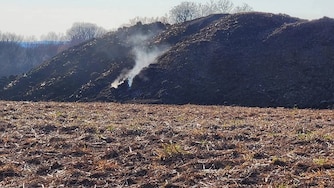Brittany Young thought she did everything right.
The founder of B-360, an organization that uses Baltimore’s dirt bike culture to promote math and science education, has been relentless in securing funding to build out her vision: a nonprofit that finds paying jobs for young people, provides free summer camp for over 400 students and offers year-round services focused on engineering education.
Now Young‘s coffers are running dry.
That’s because pandemic financial relief for nonprofits in cities and towns across the country under the $1.9 trillion American Rescue Plan Act is coming to the end. At the same time, many of these nonprofits have also been socked by the loss of other federal dollars slashed under the Trump administration, which has in turn reduced their eligibility for other matching funds.
The sharp reduction has left many of the 46 Baltimore-serving nonprofits that received direct ARPA grant awards strapped for cash and struggling to find more of it. There’s never been a ton of money available for nonprofits, they say. But this moment feels particularly uncertain, even for those who planned for it.
“We had a sustainability plan, and that plan really went out the window,” Young said of ARPA funding. “We could not predict this federal landscape.”
Read More
With ARPA support, B-360 has been able to build out its free summer camp, which only charges a registration fee. But as the COVID-era funding runs dry, the nonprofit has imposed a hiring freeze for full-time employees, consolidated programming, cut pay for young workers and scoured for additional funding to build the nation’s first-ever dirt bike campus.
For cities like Baltimore, the federal relief program has been an enormous windfall. The city received $641 million in federal funding in 2021, a year after the COVID pandemic. By the end of last year, every dollar had been committed, including $41.7 million distributed to nonprofits. Most of that money has been spent ahead of the December 2026 deadline, said Elizabeth Tatum, acting director of the Mayor’s Office of Recovery Programs.
The impact has been broad. Healthy Neighborhoods Inc., an organization dedicated to increasing home values and marketing communities, will see $162,041 by the end of the cycle. Project PLASE, which provides housing and services to address homelessness in Baltimore, is set to receive $3,500,000, the largest such award in the city.
B-360 has already spent its $1,250,000 allocation, one of the larger grants awarded in the city.

Young said it’s the confluence of many funding issues at the same time that has made her organization’s finances more stressed. Baltimore City Public Schools, one of B-360’s biggest supporters, is reeling from federal funding cuts and unable to offer the same amount of support, she added. Another $1.25 million B-360 expected to receive from the federal government this year is no longer coming through. Winning other outside grants, Young said, is also a challenge.
Other nonprofit leaders echo Young’s bleak outlook, even though some said they prepared for this day.
“We did our best to plan for that, to sustain the staffing levels and the programmatic momentum we had built,” said Jason Woody, the executive director at B’More Clubhouse, a mental health organization for adults that received $500,000 in ARPA funding to fund salaries and hire more staff. “Today it’s worked out, but everybody’s getting squeezed right now in the nonprofit world because of what’s going on at the federal level.”
If new funding doesn’t come in within the next six months, Woody said, he worries they’ll have to pause referrals to take in new clients to use their services.
The Black Arts District put their $1,000,000 in ARPA funding into a new program called “Project RestART,” a four-part initiative that provides opportunities for Black creatives in a post-COVID economy.
The district hoped to apply for new funding from the National Endowment for the Arts to continue the programming, but those grants are no longer available, said Lady Brion, the organization’s founder.
“When you have a political climate that is intentionally dropping funds away from anything with DEI, it’s a particularly difficult time for orgs like us,” said Brion.
Organizations with bigger budgets often allocated their funding to one-time capital projects, rather than using it to reduce continuing overhead costs. That has left some of them in a stronger financial position as the funding has ended.
Large, one-time funding was “something we were able to plan for knowing it was coming to an end,” said Dan Ellis, executive director at Neighborhood Housing Services of Baltimore, which used ARPA to repair 100 legacy homes and revitalize 30 vacant houses in the greater Mondawmin neighborhood, a project they have nearly completed.
Project PLASE has used the money to flip an old monastery school in Irvington into permanent and temporary housing for formerly unhoused people. After over a decade of fundraising, ARPA money became a “tipping point” that led them to break ground on the project in January, said executive director Mary Slicher.
Investing in nonprofits was part of Mayor Scott’s larger vision for using ARPA dollars to invest in communities, which aims to increase public safety and promote equitable development across city neighborhoods. ARPA dollars also went toward the mayor’s Office of Neighborhood Safety and Engagement, created in 2020. This year, homicides in Baltimore are at a historic low.
“People have seen the work. People have seen how much homicides have decreased and how the city is thriving, right?” Young said. “I really would attribute that to how he moved ARPA dollars.”

Nonprofit leaders stressed that they are now pursuing individual donations and partnerships with the city at a time when available grant donors are being flooded with applications.
Tatum from the mayor’s office said that though ARPA is ending, city agencies continue to review proposals and offer grant opportunities, she said.
Young said she hasn’t had luck yet. B-360 operates its summer camp out of Bocek Park, including using a recreation center which was also funded by ARPA dollars to the city. Recently, a group of students learned about creating 3-D modeling inside the center, while others just outside whizzed by on a nearby dirt-bike track.
“Those small dollars and cents that you don’t think about, they do add up to big things,” Young said.





Comments
Welcome to The Banner's subscriber-only commenting community. Please review our community guidelines.